Peter MALONE
Saturday, 18 September 2021 19:53
Goodbye
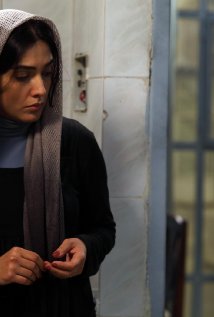
GOODBYE
Iran, 2011, 100 minutes, Colour.
Leyla Zareh.
Directed by Mohammed Rasoulof.
Goodbye is a portrait of a middle-aged woman and her actions in trying to arrange departure from Iran.
She has been a lawyer but her licence has been revoked because of her work on human rights cases. Her husband had been a journalist involved in what were considered subversive publications, and their being suppressed. He has moved to the south and is working on a building site, without any regular contact with his wife.
The complications of the woman’s life include her pregnancy, tests and interviews and the prospect of the child she is bearing having Downs Syndrome. She wants to continue with her legal cases for human rights but that is refused. She plans to leave the country and many of the sequences see her at the office, discussing passports, needing legal documents, issues about payments.
The film is grim in its picture of oppression of civil rights, the prospect of the woman not being able to leave the country – and the screenplay mirrors some of the experiences of the director in his wanting to leave the country and being imprisoned for his work.
1. An Iranian story? Characters? Setting? A character wanting to leave Iran?
2. The autobiographical experience of the director, wanting to leave the country, critique, imprisonment?
3. The Iranian city, the darker colours, interiors, sombre, exteriors? The home, offices? The streets? The musical score? The grimmer aspects of life?
4. The portrait of Noora? Age, experience? Her work as a human rights lawyer, her licence being revoked, her wanting to work on particular cases, the political difficulties? Her relationship with her husband, his absence from the film, his past editing the paper, subversive writing? His going to the south, on the building site, driving the crane? Irregular contract contact with his wife? Her pregnancy, the advice of the doctor, going to the friend of her husband, the sister as a doctor, the interviews, tests, ultrasound, the information about the embryo, the confirmation of Downs Syndrome? (The imaginative sequence with Noora lying on the bed and the young girl with Downs Syndrome lying there?) Going to the office, trying to get the documents, resistance? The application for the passport, the costs? Eventually getting the passport for herself and her husband? The harassment at home, the issue of the satellite disk and the removal of the disk and the remote? The search of the house, upsetting the book? Her mother’s visit, worrying about her daughter, going out to buy things, the meal, coming in as the room was being ransacked, sitting calmly watching the television?
5. The buildup to Noora getting her passport, contact with her husband, the taxi, her luggage, going to hotel, taking the room, hoping to leave the country from there?
6. The focus on Noora’s friends, advice, wariness about the politics? The lawyer and the discussion about cases? Noora’s mother? The people at the hotel?
7. The husband, his past career, the dangers, making contact with his wife, not leaving the country?
8. Sombre picture of human rights in Iran, political officials and security checks, opression and those who work for human rights?
Published in Movie Reviews
Published in
Movie Reviews
Tagged under
Saturday, 18 September 2021 19:53
Hearts in Atlantis
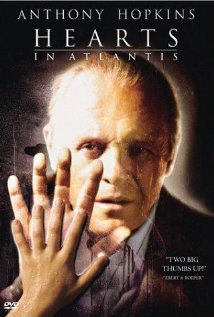
HEARTS IN ATLANTIS
US, 2001, 101 minutes, Colour.
Anthony Hopkins, Anton Yelchin, Hope Davis, Mika Boorem, David Morse, Alan Tudyk, Tom Bower, Celia Weston, Adam Lefevre.
Directed by Scott Hicks.
Hearts in Atlantis is based on a short story in Stephen King’s collection of the same name, Low Men in Yellow Coats. The principal comparison would be with Stand by Me, the focus on children, young boys and their growing up.
Although this is a gentle film, especially in the detailed relationship between Bobby and Ted, there are ominous suggestions in the background: Ted’s psychic powers, their being used by the FBI for tracking people, Ted and his not being settled, his having trances; and the sexual attack on the young girl, Carol, by the older boy as well as on Bobby’s mother by her boss.
Bobby is played by Anton Yelchin at the beginning of his career, a fine performance which led to a strong adult career in film and television. Anthony Hopkins is rather restrained in his sympathetic portrayal of the enigmatic older man, Ted. Hope Davis is Bobby’s mother and David Morse appears in the book ends of the film, the older Bobby going to a funeral, visiting his home town, encountering the daughter of the girl he had kissed.
The intelligent screenplay was written by William Goldman, expert at screenplays including Butch Cassidy and Marathon Man. The film was directed by Australian, Scott Hicks, who made such an impact with Shine and went on to make films in the United States including, Snow Falling on Cedars, No Reservations. He returned to Australia in 2009 to make The Boys are Back.
1. Stephen King story? Subtext of horror? A film about human relationships, adults and children, mother and son?
2. The 1959 setting, Richard Nixon as vice president? The newspapers? The focus on sport? The focus on politics? The FBI and the use of psychics?
3. The town, the house, the hill, the woods, the streets, cinema, clubs? The musical score? Songs?
4. The title, as explained by Ted, happiness in Atlantis? Not obtainable here on earth?
5. The opening, Bobby, adult working, going to the funeral, his friendship with Sully, inheriting the baseball glove? The news that Carol was dead? His visiting the house, the memories? The end, going back to the adult Bobby, meeting Carol’s daughter, reminiscing, the photo and the gift? His driving away, his comment on the impact that this summer had on him?
6. The flashbacks: Bobby, aged 11, his birthday, getting the adult library card, no money for the bike, his mother’s comments about her dead husband’s leaving debts, blaming him for gambling? Her work, working back, the attention of the boss – and her later going to the seminar, the sexual attack by her boss and its effect on her? Bobby, a sensible young man, accepting reality? His friendship with Sully and with Carol? Their meetings, discussions, play? The ferris wheel and Bobby kissing Carol – the kiss against which all other kisses measured?
7. The arrival of Ted, his manner, cases, going upstairs, Bobby’s mother and her instant dislike, suspicions of him, questions about inappropriate behaviour, his settling in? Ted and his manner, not giving much information? Friendship with Bobby, the dollar for reading the newspapers? His wisdom, talking about books, A Tale of To Cities, Lost Horizon? His knowledge of sport, the long story about the elderly football player and his crawling to the goal? Bobby telling him that his father was at that match?
8. The effect on Bobby, a father-figure, enjoying his company? Not able to touch Ted? Ted as a psychic? His trances? His knowledge about people, names, the attack on Bobby’s mother…? The discussion with Bobby, about the people looking for him, the notices on the trees, the suits and the hats? Bobby finding the notices, taking them down? The bullying boys on the bikes, taking the notice? Insulting Bobby as queer? The physical attacks, the attack on Carol, Bobby carrying her home, Ted and his fixing the dislocated shoulder? Bobby’s mother, after experience of the sexual attack, her suspicions of Ted,
wanting to call the police? The tension between mother and son?
9. His mother asking Ted to be a babysitter? Their going out, seen The Village of the Damned? Going to the club? The gambling? The woman at the bar, memories of Bobby’s father, not a gambler and loser, the photo?
10. The suspicious men, Bobby in the street, getting into the club to get the money for Ted? Coming back and finding Ted being taken away? The money? His bike?
11. The background of the FBI, the information about psychics, the reasons for tracking down Ted, the sinister men? Ted not able to settle, trying to move to safer places?
12. The effect on Bobby, the reconciliation with his mother, their leaving, the bike on the roof of the car?
13. A portrait of an 11-year-old boy, his family situation, his mother, Carol and Sully, and the impact of Ted?
Published in Movie Reviews
Published in
Movie Reviews
Tagged under
Saturday, 18 September 2021 19:53
Mesrine, Killer Instinct
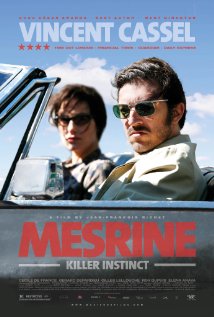
MESRINE PART 1:KILLER INSTINCT
France, 2008, 133 minutes. Colour.
Vincent Cassel, Cecile de France, Gerard Depardieu, Gilles Lellouche, Roy Dupuis, Elena Anaya, Michel Duchaussoy, Miriam Boyer, Ludivine Sagnier.
Directed by Jean- Francois Richet.
Jacques Mesrine (the s is silent and Mesrine became upset when people pronounced it wrongly) was a famous criminal in his time, the 1960s and 1970s in France and in Quebec, not a household name elsewhere. However, Killer Instinct and its second part, Public Enemy Number 1 certainly put him in the cinema pantheon of crime celebrities.
The first film on Mesrine is called Killer Instinct after his own book. The second film is Public Enemy Number One, the media headline for his career. The first film covers the 1960s, the second the 1970s. And each is quite different in its treatment of Mesrine and his career as well as the visual style and pacing.
The first film opens with a stakeout in 1979 and the death of Mesrine and his girlfriend, Sylvie, in a hail of bullets into their car (and there are other allusions to Bonnie and Clyde in the films). It then goes back to Algeria 1959 where Mesrine is involved in questioning and torture of insurgents and shows his metal by shooting one of them on orders. The second film ends with a longer reprise of the stakeout, the pursuit of Mesrine and Sylvie and the shooting.
For those who are interested in delving into the mentality of a criminal, the first film is the more rewarding. For those who like action and the creation of legends, that is the task of the second film.
Vincent Cassell is ideal casting as Mesrine. Over the years, Cassell has excelled at villains and creating an impression of evil – although he can show moments of tenderness as well as he does initially with his wife but does with his children. He has said that he wanted to make Mesrine human but not show him as in any way a hero.
When Mesrine returns to his family from Algeria and the prospect of working in the lace business, he is more interested in the contacts his friend Paul has with the criminal world, especially gangster boss Guido (played with steely solemnity by a heavy Gerard Depardieu).
Soon involved in robberies, Mesrine angers police, challenges Guido who supports him – but the spree cannot last and Mesrine finds himself in prison. But not for long. After the first crimes, Mesrine and Paul travel to Spain and meet up with some young women and Mesrine marries. But he is too moody and violently dominating for it to last. However, he is devoted to his daughter.
An encounter with a charmingly tough woman with criminal intentions, he forms his own small gang, always with the police after him. He finds they have to move to Montreal.
Mesrine, Public Enemy Number One has a different tone from the first part. It is full of exploits. At first, undercover as a building worker, he becomes friends with a fellow worker and involved in robbery. X gets a job for them both with a wealthy entrepreneur. Mesrine becomes indignant when he is treated as a mere servant and virtually abducts the man. When he and X are caught, he is imprisoned – but once again shows his flair for escaping. On his return to France, he is something of a big time criminal hot shot and plays up to this reputation, abetted by the media. In prison again, he encounters a criminal (Matthieu Amalric) and is soon on the loose again.
Mesrine is both self-confident and rather vain in his celebrity status and enjoys defying the police who are intent on his arrest. As we know from the outset, they do get him in a hail of bullets, a later Gallic version of the American gangsters of the Depression era.
More than effectively made, a most persuasive performance from Vincent Cassell and an immersion in a criminal world.
1. This film as a separate film? Or as part one of the complete film?
2. The opening, death, the audience knowing what ultimately happened, the portrait of Mesrine, his life?
3. 10 years of his 20 year career? Algeria, his military service, the scene of the torture, the effect on him? The return to his family? His reaction to his family, their reception of him? Meeting his friend, going to Guido? The challenge, crimes, life and style? The visit to Spain, finding Sonia, his relationship with her, marriage, children and the family? The jobs, going to prison? Change in him, role model? Retrenchment, the clash, the violence towards his wife, crimes and vengeance? Going to Canada? The job, the meeting, contacts? The relationship with Jeanne? His being caught, prison, torture, the escape, the return to France? His reputation in France? in Canada?
4. The performance of Vincent Cassel, his age, change over the 10 years, the various disguises? Personality, change in personality, his self-evaluation?
5. Algeria, the locations, the offices, the torture, the garden, his being asked to shoot the wife of the suspect, his shooting the suspect?
6. His return, the bond with his parents, the meal, Paul, going out, the interview, taking on a job or not? His father and his weakness, blame? Going to Guido, the jobs, defying Guido, Guido liking this?
7. Paul, as a type, jobs, as a friend, drinking and cards, the visit to Spain, the impact of Guido, Guido’s death?
8. Spain, the girls, his falling in love, the touch of tenderness, marrying, the child, the hospital? With children, the outings, their schooldays? His wife and her fears? His mixing with the prostitutes? Reconciliation? Her begging him to stop, the slap, his leaving, leaving the children with his parents?
9. The portrait of Guido, gangster, personality, hard, the soft touch, crimes, violence, prison, his death?
10. Job, retrenchment, the encounter with Jeanne, his reaction?
11. Violence at the casinos, the shooting? Guido and Paul killed? His decision to go to Canada?
12. Montréal, working on the building site, his friend, as a chauffeur, getting the sack, anger and respect? Kindness and cruelty? Wealth, the struggle, rest? His cover with the respectable family? The development of the relationship with Jeanne, the love him, her character, partnership and the crimes?
13. His case, the sentences, defiant?
14. Prison, rough, in solitude? Light and dark, the meal, the hose? The letter? On the yard? The tough prisoners? Finding a friend? Observing? The sentries? Supervision, the plan, the help, the cutters and the escape?
15. The girls, Jeanne and her decision? Mesrine and his notoriety?
16. The end of the first part, the experience of Mesrine, within the social context, the 60s and 70s? Information, the newspapers, television?
17. His return to France and the second part?
Published in Movie Reviews
Published in
Movie Reviews
Tagged under
Saturday, 18 September 2021 19:53
Hook, The/ 1963
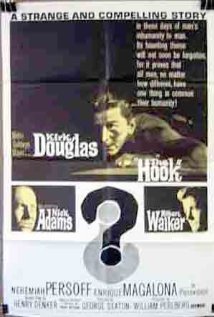
THE HOOK
US, 1963, 98 minutes, Black and white.
Kirk Douglas, Robert Walker Jr, Nick Adams, Pancho Magalone, Nehemiah Persoff.
Directed by George Seaton.
The Hook is a sombre film about war, with a Korean War setting, especially in 1953 and the time of the ceasefire. The film shows some action, but it is more the Americans packing up, going in a boat into safe territory and the end of the war. The focus is on a group of three Americans, Kirk Douglas as Briscoe, the hard, rule-bound leader, commissioned by the stern authority to kill prisoners. There is also Nick Adams as Hackett, a young man, with Briscoe having a hold over him having saved him in a bar fight. There is also the young men, Dennison, played by Robert Walker Jr. and the Korean prisoner is played by a Philippine actor, Pancho Magalone. The captain of the ship is played Nehemiah Persoff.
Direction is by George Seaton, a prominent writer and director in Hollywood, with such credits as The Miracle on 34th Street, The Country Girl. At this time he made The Counterfeit Traitor and 36 Hours, with war themes. One of his final films was Airport.
The film raises issues about regulations, about racist and enemy hostility, about derogatory language, such as the word gook, as well sensitivities and conscience in killing.
The film was made during the Missiles of October crisis in 1962. It was released four months before the assassination of John Kennedy. And America was beginning its war presence in Vietnam.
1. A war film? Anti-war film? From the 1960s? Relevance today?
2. Korean locations, at sea? The atmosphere of the Korean War? The 1950s? Divided Korea? American involvement? The end of the war, the ceasefire? The background of the filmmaking, 1962 and the Missiles of October? Release four months before President Kennedy’s assassination? American involvement in Vietnam?
3. The war situation, the Americans packing up, leaving, the Korean attacks, prisoners of war? The Americans? Attitudes towards the Koreans, the use of the word ‘gook’? The criticism of the word during the film? Its being used during the Vietnam war and afterwards?
4. Briscoe, Kirk Douglas character, in command, the situation, packing up, the prisoner, the phone call from headquarters, the strong demands that the prisoner be killed? His taking the responsibility? His relationship with Hackett and Dennison? Supporting Hackett, his allegedly attacking an officer? Dennison as a young man, sympathetic?
5. On board, the captain, his crew, the mission, his skill in guiding the boat, his decisions about possible sabotage? His interest in the characters, critical of Briscoe, sympathetic towards the others trying to save the Korean? The funerals at sea? The plane attack, the strafings?
6. Briscoe, his demands, the Korean soldier, the rules, attitudes, towards Dennison, patronising, his power over Hackett? The confrontations with the prisoner? His orders? Getting Hackett drunk? The challenge for him to kill the prisoner, his being unable? His comments about moments of being soft? The information about the ceasefire? The escape of the prisoner, possible sabotage, his pursuing him, the fight, killing him? And Dennison explaining that he was saying that he was unable to kill? The aftermath, the funeral, Briscoe talking with the three, the effect of this war experience on him?
7. Hackett, the drink, his violence, attitude towards the prisoner, the hold of Briscoe, the discussions about being a corporal, Briscoe saving him, the revelation that he was drunk and did not attack the officer? Briscoe’s hold over him? His explanations to Dennison? The bottle, his drinking, unable to kill? His helping with the prisoner trying to escape?
8. Dennison, young, more sympathetic, understanding, issues of language, helping the prisoner? Helping him escape? Going overboard – and Briscoe helping them back?
9. The prisoner, his experience, his card, wife and child, trying to escape, possible sabotage, the group unable to kill him, being lowered in the boat, the capsizing, Dennison rescuing him, Briscoe pulling him to the boat? His escape, in the hold, the confrontation with Briscoe, his death?
10. The realities of American involvement in wars like the Korean War? American superior attitudes? And the war about to unfold in Vietnam?
Published in Movie Reviews
Published in
Movie Reviews
Tagged under
Saturday, 18 September 2021 19:53
Breathless/2012
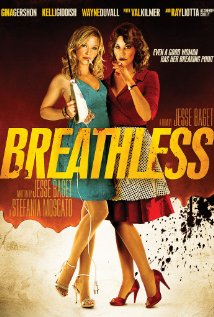
BREATHLESS
US, 2012, 92 minutes, Colour.
Gina Gershon, Kelli Giddish, Val Kilmer, Ray Liotta, Wayne Duval.
Directed by Jesse Baget.
Breathless was written, directed and edited by Jesse Baget. At times, during the action, with so much dialogue and the action confined to the interiors of the house, one could assume that it was based on a theatrical piece.
The opening credits sequence is striking with extreme close-ups of hands, painted fingernails and the preparation of a meal. Gina Gershon has had an interesting career with characters in such films as Bound and Showgirls. Here she appears has Lorna, living in a Texas trailer, looking and acting like a heroine of 1950s Hollywood melodrama. She calls her girlfriend, Tiny (Kelli Giddish) with broad Texas accent and again, straight out of the movies. Then it is revealed that Lorna’s husband, Dale (Val Kilmer) is lying on the floor, having committed a bank robbery, then tied up and interrogated by the two women, eventually admitting the truth.
By this time, audiences will be adjusting to the style of the film, the black humour and the violence, especially when Lorna accidentally shoots her husband and he has to be cut up and disposed of.
With the arrival of a private detective, the many twists begin, revelation that Tiny has been having an affair with the husband. The two women turn on each other. Lorna won’t let the sheriff, Ray Liotta, into the house and he waits outside, allegedly waiting for a warrant.
But then the plot twists again, police arriving, more deaths. And then the revelation that Lorna is having an affair with the sheriff, cutting off the finger to indicate that she has been killed, digs up the money from the garden, puts it in her hair curlers and goes off – with the revelation that she’s been having an affair with the sheriff.
1. A black comedy? With violence?
2. The title, with reference to the different characters?
3. The credits, the extreme close-ups of the hand, the fingernails and paint, preparing the meal, cooking?
4. The action confined to the interiors of the house? The moments outside, the police car in the distance? The finale on the road? The musical score?
5. The focus on Lorna, her look, make-up and hair, the melodramas from Hollywood? Her sitting at the table, quiet, smoking? The arrival of Tiny? Her look, manner of speaking? Friendship with Lorna? Confiding in each other? Seeing Dale on the floor?
6. Considering the plot in retrospect after the revelations and the twists? The credibility of Lorna’s behaviour, towards Tiny, what she was really thinking, what she had planned, how she was executing it? Seemingly offhand, emotional? Tiny and her reactions, seeming ignorance, the revelation of her behaviour, her attitude towards Lorna?
7. The story of the robbery, the headlines, Lorna knowing that Dale did it? His past experience of robbing convenience stores? His reputation? Dumb character? Reviving, their tying him up, the interrogation, his caving in? Lorna with the gun, the accident and his being dead? Lorna upset? Tiny and her chopping him up? The bag on his head? Disposing of the parts? The mixer, the sink? The comedy getting blacker?
8. The arrival of the Sheriff, Lorna not letting him in, putting him off, telling him about Dale? The irony of this being seen as innocent, wanting a warrant? His wanting a drink? His waiting outside?
9. The investigator turning up, his manner, behaviour, the money, spying on Dale, his relationship with Tiny? Her admitting the truth? The animosity between the two women?
10. Investigator, his character, tripping, his death?
11. Lorna and Tiny, their talk, explanations, antagonisms? Tiny standing on the rug, Lorna pulling it, Tiny’s collapse?
12. Lorna, cutting off her finger? Putting the money in her hair curlers? Digging up the money? Leaving – on the road, the encounter with the sheriff again,
the revelation that they were in cahoots together?
13. The police arriving, two deputies, horrified at the scene? The sheriff, shooting Tiny? His application for resigning? The document?
14. On the road, Lorna’s arrival – and their plot together?
15. A story about completely amoral people – done with black comedy and spoof?
Published in Movie Reviews
Published in
Movie Reviews
Tagged under
Saturday, 18 September 2021 19:53
Into the Woods
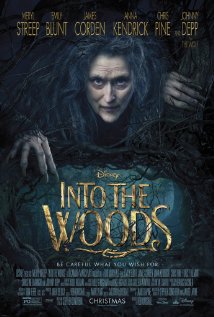
INTO THE WOODS
US, 2014, 124 minutes, Colour.
Anna Kendrick, Johnny Depp, Emily Blunt, Chris Parlane, Meryl Streep, Lucy Punch, Christine Baranski, James Corden, Mackenzie Mauzey, Lilla Crawford, Billy Magnussen, Daniel Huttlestone, Frances de la Tour, Tammy Blanchard, Tracy Ullman, Simon Russell Beale, Anette Crosby, Joanna Riding.
Directed by Rob Marshall.
This is a lavish production and filled with quite an accomplished cast. Those who go to see the film without any previous knowledge may be taken aback and will have to adapt themselves to a style of musical theatre, which is a blend of the very theatrical treatment along with attempts at realism, all in the cause of telling fairy stories in words and music.
For many audiences, this is a great opportunity, a spectacular opportunity in fact, to be part of a Stephen Sondheim musical. From West Side Story and for over more than half a century, Sondheim has created many musical theatre pieces, often adapting films and plays, using his characteristic recitatif style for the singers and his own idiosyncratic mood melodies for the musical score. Not necessarily to everyone’s taste. But Into The Woods offers a rare opportunity for Sondheim lovers and those who wonder what his style is like.
It should be said that this is not a light entertainment. Even though it combines the stories of many familiar fairytales, it is not the sweetness and light of the fairytales but rather the grim aspects of storytelling, tales of the dark side of human nature, at times truly grim fairytales.
The film begins, Sondheim-style, with many of the characters, seen in a variety of situations, combining with the recitation of what it is to go into the woods. This introduces the range of characters which include Cinderella, her stepmother and the ugly sisters, the town baker and his wife, Red Riding Hood, Rapunzel in her tower, Jack and his mother, the ugly witch and Prince Charming and his friends. The song also offers the opportunity for audiences to identify, quite quickly, the cast with characters. We find Anna Kendrick as Cinderella, Christine Baranski, Lucy Punch, Tammy Blanchard as her stepmother and the sisters, James Corden and Emily Blunt as the baker and his wife, the Lilla Crawford as Little Red Riding Hood, Mackenzie Mauzey as Rapunzel, Daniel Huttlestone and Tracy Ullman as Jack and his mother, Meryl Streep as the witch, Chris Klein as the Prince. A number of prominent British character actors have small cameos. They include stage actors like Simon Russell Beale, Annette Crosby, Joanna Riding, Frances de la Tour.
While all of them give striking performances, there is the exception with Chris Pine as the Prince, not particularly charming, not particularly persuasive, even though he is offering something of a sendup of charming princes. It is James Corden and Emily Blunt as the baker and his wife who offer the most humanity. And by way of postscript, Johnny Depp has a very brief appearance as a rather odd Wolf.
At the core is a curse by the witch on the baker and his wife, hoping for children, but the witch preventing pregnancy until she collects four items belonging to the fairytale characters, Jack’s white cow, Red’s Riding Hood, Rapunzel’s hair, Cinderella’s slipper. This provides occasion for strange adventures in the woods as well as a number of musical interludes.
One of the major complications is that the baker pays for Jack’s cow with some beans which are carelessly tossed away leading to the growth of the giant Beanstalk and the descent of the giants to earth, with the need to combat them and destroy them. Another complication is that of the witch who has abducted Rapunzel as a little girl and kept in a tower, pretending to be her mother, transformed after she obtains all her desired objects into a much more familiar Meryl Streep.
This is not a story of happy endings, especially for the baker and his wife, which takes some time for an emotional adjustment. For those in the know, they will have a lavish Sondheim experience. For those not in the know, there may be more pleasure in reflecting on what they have seen than in the experience while they watched the film.
1. The work of Stephen Sondheim, his musicals, music, lyrics, style?
2. Screen adaptation of a theatre piece, the theatricality, plot, performances, situations? Attempts to make it ‘real’ – making the film less convincing cinema?
3. The locations, the woods, the edge of the woods, the interiors, the trees, the palms, the pit? Grandmother’s cottage? The castle? Cinderella’s house? Rapunzel’s tower? Jack’s house? The Beanstalk? The world of fairytales?
4. The stories, the tradition of the Brothers Grimm? Not just pretty stories? Dangers, threats, witch’s curses, cruelty, characters charming, characters sinister? The Beanstalk, the giants, death? The range of deaths and the sombre tone?
5. The mix of popular stories? The songs, the duets, recitatif?
6. The cast and the impact?
7. The introduction, Ella, the sisters, ugly and cruel, the stepmother, cruelty, work? The birds and their gathering? The dress? Going to the ball? The transition to Jack and his mother, the cow, poverty? The transition to the baker and his wife, nice, in the town? The transition to Rapunzel and her hair? The transition to the Palace and the prince? The transition to the witch, her appearance, curse? The baker’s father? The taking of Rapunzel? The witch becoming a mother, the warnings? The bakers and the curse, no child, the witch’s command for them to collect the items?
8. The setting for Into The Woods and all singing?
9. Ella, leaving, the prince, his friend, the ball, the slipper? The prince, charming or not? The reaction with the ugly sisters, the slipper, cutting the toe, cutting the heel to fit the slipper? Ella and the slipper fitting? The Baker’s wife and stealing the slipper? Ella giving it as a gift?
10. Jack, the Baker and seeking the cow, persuading Jack, the beans, the death of the cow, the witch and the resuscitation, the plan of covering the cow in flour?
11. The beans, throwing them away, stalk, giant, going to the land of the giants, returning with the coin, Jack and the harshness of his mother? He being a simple soul? The baker, the dangers, chopping down the tree? The death of the tree, the new stalk? Jack’s mother and her reaction? The second giant, terrorising, the decision and Jack as the bait, in the tree, the giant falling into the pit?
12. The baker and his wife, the search, earnest? The slipper and the cow? The wife and her cutting of Rapunzel’s hair? Red Riding Hoodor’s jacket? The transformation?
13. Red Riding Hood, travelling, the wolf, the forest, Johnny Depp as the wolf, deceiving her, going into the house, her grandmother, destroying the wolf? Red Riding Hood joining the group? Giving the red jacket?
14. The prince, riding, not charming, his friend, in love with Rapunzel, Rapunzel in the tower, thinking the witch was her mother, the escape? The vindictive witch? The prince, his approach to the Baker’s wife, and her response, and her death?
15. The witch, ugly, the transformation, but her dying in the pit? Fight against the giant? The Baker’s wife and the curse lifted and her being able to bear the child? The birth? Ella and Red Riding Hood minding the baby? The final appearance of the baker’s wife and her comfort to her husband?
16. Into the fairy stories, grim aspects, fairytales and threats? Fables and messages?
Published in Movie Reviews
Published in
Movie Reviews
Tagged under
Saturday, 18 September 2021 19:53
Keep on Keepin' On
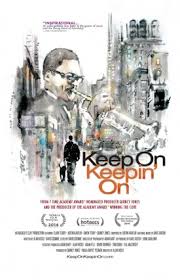
KEEP ON KEEPIN’ ON
US, 2014, 84 minutes, Colour.
Clark Terry, Justin Kauflin, Quincy Jones, Gwen Terry.
Directed by Alan Hicks.
There are many films which are called “feel good”. With this film, the audience feels good, but feels even better.
Jazz aficionados will know the name Clark Terry. Those not into jazz may not have heard of him, but he is considered one of the best jazz artists of the 20th century, a trumpeter par excellence. This is his story.
The film was co-written and directed by Australian, Alan Hicks, a drummer who attended the William Paterson University for Music/Jazz Studies and was tutored by Clark Terry. However, Hicks is very self-effacing and does not appear in the film at all, no mention of his musical background. Rather, he wants to concentrate on Terry but also introduces another student at the William Paterson University, Justin Kauflin. This makes for an interesting and entertaining interaction, the elderly musician as teacher and the young piano player as student, relating to Clark Terry not only as mentor but as friend.
During the filming, Clark Terry turned 90, 91 and 92. He was still living at the time of the film’s release. We see him more immediately in past action before the film goes to the biographical aspects. At once, we realise that he is a very genial man and who is supported by his wife, Gwen, not only for their long marriage but, especially, as his health fails. He has been a long-time diabetic, now experiencing trouble with his eyes and, eventually, the need for amputating both legs. (As with the film about Roger Ebert, the Chicago critic, Life Itself, which showed Ebert in his years dealing with cancer in his chin and face, not afraid to appear on screen in the debilitated state, so this film shows Terry, often in hospital, in treatment, and at home.
It should be noted the Justin Kauflin suffered from a rare eye disease when he was born, losing his sight as a child, but optimistic, especially when he discovered that he had a talent and an urge to play the piano, fine long fingers enabling him to play with dexterity. He met Terry when he was a student in 2007 and they became friends, Justin often visiting him, having classes and jam sessions together, Terry encouraging Justin to practice and enter competitions. just comes across as a fine young man, in the scenes at home with his mother, with Terry and Gwen, in performance.
Clark Terry had a very interesting career, playing with the Duke Ellington band for 10 years, then joining Count Basie, then being one of the first African Americans to play for a television studio orchestra. A young man who was in awe of Terry approached him and Terry became his mentor as well. This was Quincy Jones. Terry then played for Quincy Jones in his band and they became lifelong friends. In the film (and Quincy Jones became a producer of the film) he is seen visiting Terry when Justin is present, sees him playing the piano and, ultimately, invites him to join him on a world tour and offer him a contract. Justin wrote a great deal of the music for this film.
With so much archival material presented, the audience has a very good impression of Terry’s life and career, his performance and skill. Audiences will enjoy his manner of teaching, lying ill in bed, riffing on themes, advising students, and all the time enjoying things thoroughly, with his idiosyncratic vocabulary which means that practically everyone is referred to as, baby.
The film is an excellent musical documentary – but, it is far more, really showing the nature of a vocation to music, a vocation to teaching, the effect of human interaction between teachers and students.
Definitely, feel-better.
Published in Movie Reviews
Published in
Movie Reviews
Tagged under
Saturday, 18 September 2021 19:53
Imitatiion Game, The
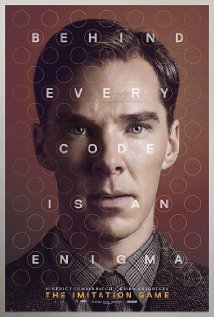
THE IMITATION GAME
UK, 2014, 114 minutes, Colour.
Benedict Cumberbatch, Keira Knightley, Matthew Goode, Mark Strong, Charles Dance, Alan Leach, Tuppence Middleton, Rory Kinnear, Steven Waddington, Matthew Beard.
Directed by Morton Tylden.
A fine, interesting drama.
Over the years, there has been great interest in the story of Bletchley Park, the team assembled to work on the Enigma code, the elaborate Nazi code for transmitting information during World War II. Michael Apted directed a somewhat fictitious fashion, Enigma (2000). Television offered a series, Bletchley Park.
But, not only is the breaking of the Enigma code something significant in war history, the breaking was the work of mathematician, Alan Turing. This film is a tribute to a brilliantly intelligent man, with some autism characteristics, something of a personal loner, who had his own personal secrets at the time, his sexual orientation and behaviour, which led to his death in 1954.
All these aspects are covered in The Imitation Game.
The film uses the framework of a police investigation of Turing the early 1950s. We are introduced to Turing, having experienced a break-in at his flat, arrested and interrogated by the police. Because the documents of his war activity are classified as top secret, the police are suspicious of him, possibly as a traitor (the era of Burgess and Maclean’s defection to the Soviet Union), and his strange personality. He finds it difficult to collaborate with the police. During the action in the 1940s, the screenplay does come back to this 1950 situation as a more sympathetic investigator (Rory Kinnear) is able to access more documents and understand him.
This offers a more ambiguous opening to the portrait of Turing. As he is played by Benedict Cumberbatch, we are offered a complex portrayal of Turing’s complexities. He makes quite some impact when he goes to an interview for work at Bletchley Park, not given to modest understatement about his abilities, his success at school, at Oxford University, his university tenure in his early 20s. The subsequent drama, the conflict between Turing and the military establishment, as highlighted by the performance of Charles Dance as an officer with more knowledge about rules and pomposity than what was required for the job. Also at the interview is the head of MI6, played with some sinister sympathy by Mark Strong.
While most of us will not understand the technical details or the technological requirements workings of the machine to break Enigma, there is enough drama, sequences in the computer room, discussions amongst the workers, a kind of antipathy towards Turing and his seemingly smug superiority, that we get a great feel for what happened, what was demanded for breaking the code, for Turing’s contribution and the eventual collaboration which broke the code.
Turing wants some collaborators and sets up a crossword puzzle test through the newspapers to find minds who are quick at codes and think laterally. One of those who emerges years is Joan, played by Keira Knightley, doing an intelligent variation on her English rose performances.
Of course, there is great suspense as to how the code will be broken, with Turing coming to the realisation that it needs a machine to break a machine. In fact, in looking back at the history of computers, Turing has a singular place in his contribution to the building of computers and understanding their intelligence and their achievements.
During the film, there are some flashbacks to his days at school, where he was bullied, but made great friends with a young boy, Christopher, after whom he called his machine. There is insight into Turing’s character, his understanding of himself, his self-confidence, and his emotional dependence on Christopher.
At the end of the film, there is explanation given about Turing and his sexual orientation, the use of ‘chemical castration’ medication, the effect of secrecy and possibilities of criminality on his consciousness and his death. The film tries to give some acknowledgement of him and his achievement and the information that a pardon was extended by Queen Elizabeth in 2007.
While the whole cast is very strong, this is yet another achievement for Benedict Cumberbatch, who has shown his wide range in his performance in the Sherlock series, as the voice of Smaug in the Hobbit trilogy, his villain in Star Trek, his portrayal of Julian Assange in The Fifth Estate.
1. Audience knowledge of and interest in World War II, Bletchley Park, the importance of the Enigma Code and the solving of it?
2. The focus on Alan Turing, audience knowledge of him, his work at Bletchley Park, as a person, after the war, his sexuality, police intervention, his suicide?
3. The structure of the film: the war experiences, the flashbacks to Alan’s life as a boy at school, the influences, skills? 1951, the aftermath of the war, the secrecy about Alan, the police investigation and arrest? The effect of the placement of the interconnections?
4. The focus on the post-war era, the mystery about Alan? The police inspector, Nock and his superior officer, treatment of Alan, the attack on his flat, the puzzles, the evidence? The interviews, the officer and his research, finding ways of getting secret documents, coming up against a brick wall? Alan, living alone, his work, the machines in his flat? His personality? Attitude towards the police, the truth, the attack on the flat by the man he picked up? The damage, the secrecy?
5. The flashbacks to the past, his age, family background, clever, class, games, the teachers and and his work in class, their comments on him, the boys mocking and bulling? His friendship with Chris, affection, sharing, the discussions, affection, the codes and their meanings? Chris not returning, illness and death? The headmaster and information? Alan, secret, sexuality?
6. Information about his career, studies, his degrees, his position at Cambridge, at a young age? Alan and his interest in the war effort, going to the interview, Denniston and the traditions, stiff and manner, and unimaginative? The rules? Blunt answers? The reaction of Denniston? Dislike? Denniston’s interventions later, disapproving of the money made available for the machine? Firing Alan? The group standing up against Denniston? Denniston and his being overridden?
7. Menzies, MI6, listening, impressed, hiring Alan? Explaining Enigma? The need to solve the puzzles and break the code, the number of deaths of those saved? Approving Alan’s appeal to Churchill for the money? The discussions? Cairncross and his being the mole? Alan being arrested, Denniston feeling justified, Menzies knowing the truth, freeing Alan, keeping a control on Cairncross and the information given to the enemy?The members of the staff, Hugh Alexander, arrogant, the ladies’ man, antagonism towards Alan, insulting him? The boycotting? Cairncross and his position, Peter and his brother in the merchant Navy? Dislike from the group, Alan as a loner, answering rally, as regards, John, trying to tell a joke? The anger of the men? The change, growing admiration, collaboration, dedication and time given?
8. Building the machine? The size, the intricacies, the puzzles? Getting ideas, reminding them? Functioning? The initial phase?
9. Increasing the staff, the crossword puzzle to be solved, the advertisement, the applications, supervising the tests? Joan, not being allowed in because she was a woman, allowing her to do the test, the results? The background and abilities? Getting lodgings with the other women, the cover job, friendship, supplying ideas? Eliminating possibilities to streamline the problems in the code? The meetings with, her friend, her friend interested in Hugh? The friendly talk, romance, sex? The engagement? As cover? Good friends, but the truth, eventually having to tell Joan the truth? Are understanding and patience and acceptance? Later meetings?
10. The teamwork, the timing, Alan accused by Denniston, the truth about John?
11. The deadline, Denniston and his intervention? Attention, the success? The discussions about not letting people know? Because the Germans could change the code? The dramatic point of Peter and his brother being on the ship which was to be destroyed?
12. Ensuring, achievement, the team at Bletchley Park?
13. After the war, this quiet life, legislation in the UK, homosexuality as a crime, the police, the arrests, interrogations, processes, chemical programs, chemical castration, enduring this, the growing impossibility? His suicide?
14. The 21st century, acknowledgement and his work, Queen Elizabeth pardoning him?
Published in Movie Reviews
Published in
Movie Reviews
Tagged under
Saturday, 18 September 2021 19:53
Pool Boys, The
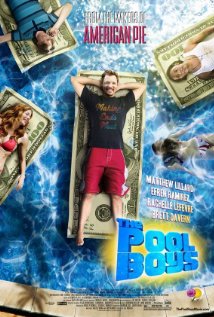
THE POOL BOYS
US, 2011, 107 minutes, Colour.
Matthew Gillard, Brett Davern, Efren Ramirez, Rachelle Lefevre, Tom Arnold, Robert Davi.
Directed by J.B. Rogers.
No recommendation for this one although fans of crass comedies judge it as quite funny.
In the past, some commentators refer to films has having “a low moral tone”. This is the case with this film – which is reminiscent of Risky Business and The Girl Next Door. Rich people go on holidays leaving the house in the care of characters who are not particularly responsible and get caught up in plans for turning the vacant house into a brothel – although this film’s dialogue is rather prim, wanting to avoid the word, prostitute, and substituting the word, escort.
A young man has graduated and is about to apply for a scholarship for Harvard. He is played by Brett Davern. His cousin, Matthew Gillard, is a seemingly respectable businessman but, in fact, is a pool boy at a mansion and shares an apartment with some suspicious characters, drugs and sex being involved. When the young man finds that his job in Washington has been sabotaged because the senator is a paedophile, he rings his cousin in LA, is deceived initially, but realises the truth, that his cousin is something of a loser.
There is a brainwave and it is decided to the mansion into a glamorised sex resort, building up not only a group of escorts, who all look like the supporting cast of a Hollywood soap opera, and a range of clients, some of whom are very kinky.
The young man resists first, but then brings his mathematical capacities to organising the goings on, admitting to himself that he is a pimp. When the owners of the house return, the owner, being a businessman, demands the money instead of turning them into the police. The examiner for the scholarship arrives and is immediately put off. The final idea is to have a huge party, along with sexual shenanigans, with neighbour, Tom Arnold as himself, exhibiting all kinds of mania. The young man’s parents arrive, the truth is revealed, he has discussions with his father – and, as always, no matter what the situation, all is forgiven.
While any human activity can be the subject of comedy, even this subject, but the basic premise has an exploitation of women, sexuality, of dominant males who are making money – all dressed up as a glossy sex comedy.
Published in Movie Reviews
Published in
Movie Reviews
Tagged under
Saturday, 18 September 2021 19:53
Knights of Badassdom
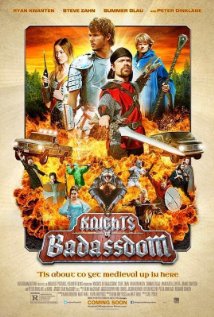
KNIGHTS OF BADASSDOM
US, 2013, 86 minutes, Colour
Steve Zahn, Ryan Kwanten, Peter Dinklage, Jimmi Simpson, Summer Glau.
Directed by Joel Lynch.
The Internet Database notes that the director of this film, Joe Lynch, was raised on a steady diet of B-movies, Stephen King novels, heavy metal, games and comic books, creating home spun effects to shock his family members.
This is the mentality of a precocious boy who wants to make movies. And that describes something of what this film is. For most audiences it is exceedingly silly.
For those who play computer games with overtones of Dungeons & Dragons and Knights, for those who design them, for those who become absorbed with Game of Thrones and have an easy tolerance barrier, there could be some entertainment.
This is a story of friends and people in an American town who are so enamoured of such Game of Thrones worlds, that they spend their time studying up mediaeval lore, preparing costumes for re-enactments, for cultivating and ye-oldy vocabulary and deliverance, thinking up spells and other concoctions – as well as having strong rivalries.
As the initial credit show, they do some rituals in the forest with the help of a book which has a mysterious stone glow, and open up the dark regions. Much of the film is re-enactment, corny mediaeval-type encounters, real life when time out from the game is demanded, and a whole lot of silly incidents are depicted. Until a spell is uttered and the sky produces a femme fatale (looking exactly like the hero’s ex-girlfriend) who proceeds to destroy a lot of the players. For those audiences with a bit of a humane touch, the killings are rather unexpected as well as gory. However, computer game players who are bent on destruction of enemies as they play will take all this and their stride.
The hero is played by Australian Ryan Kwanten, who has broken up with his girlfriend, is more than a bit sick of playing mediaevil games but is persuaded by his friends, especially the towns Wizard, Steve Zahn, to participate. He meets an attractive young girl who also takes the game seriously and they discover the dead bodies, finding that they have to confront the evil spirits, and speak out some spells. The rather obnoxious captain of the other team is played by Jimmi Simpson as a vain twit.
Unfortunately, too many drugs (which might explain the screenplay and the direction) and sexual references for younger audiences, under 12, who might find that this is a show with buzz.
Published in Movie Reviews
Published in
Movie Reviews
Tagged under